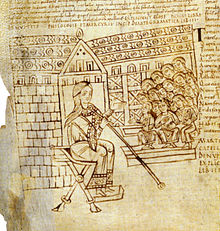
Back مارتيانوس كابيلا Arabic Marcianu Capella AST Марциан Капела Bulgarian Marcià Mineu Fèlix Capel·la Catalan Martianus Capella Czech Martianus Capella German Μαρτιανός Καπέλλα Greek Marciano Kapela Esperanto Marciano Capella Spanish مارتیانوس کاپلا Persian

Martianus Minneus Felix Capella (fl. c. 410–420) was a jurist, polymath and Latin prose writer of late antiquity, one of the earliest developers of the system of the seven liberal arts that structured early medieval education.[1][2][3][4] He was a native of Madaura.
His single encyclopedic work, De nuptiis Philologiae et Mercurii ("On the Marriage of Philology and Mercury"), also called De septem disciplinis ("On the seven disciplines"), is an elaborate didactic allegory written in a mixture of prose and elaborately allusive verse.
Martianus often presents philosophical views based on Neoplatonism, the Platonic school of philosophy pioneered by Plotinus and his followers.[5]
Like his near-contemporary Macrobius, who also produced a major work on classical Roman religion, Martianus never directly identifies his own religious affiliation. Much of his work occurs in the form of dialogue, and the views of the interlocutors may not represent the author's own.[6]
- ^ Margaret Deanesly, A History of Early Medieval Europe: From 476–911 (New York: Routledge, 2020).
- ^ Jack Lindsay, "Introduction: Apuleius and His Work", in The Golden Ass, trans. Jack Lindsay (Bloomington: Indiana University Press, 1960), p. 25.
- ^ Andy Merrills and Richard Miles, The Vandals (Chichester: John Wiley & Sons, 2010), p. 213.
- ^ Ian Wood, "Latin", in A Companion to Late Antique Literature, ed. Scott McGill and Edward J. Watts (Hoboken: John Wiley & Sons, 2018), p. 27
- ^ Danuta Shanzer, A Philosophical and Literary Commentary on Martianus Capella's De Nuptiis Philologiae et Mercurii Book One (University of California Press, 1986), pp. 14, 136 et passim; Stahl, et al., vol. 1, p. 10.
- ^ Stahl and Johnson with Burge, The Quadrivium of Martianus Capella, p. 5ff.; Alan Cameron, The Last Pagans of Rome (Oxford University Press, 2011), p. 265ff. Cameron finds it highly unlikely that a non-Christian could participate prominently in public life at this late date.